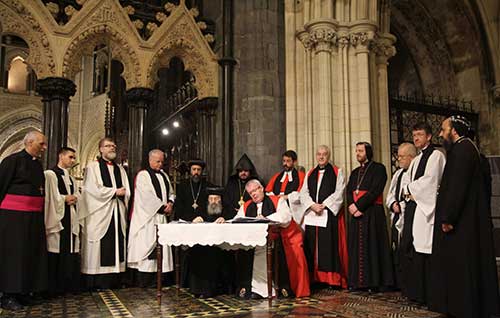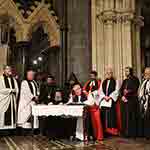
No sooner have we been having our own discussion on this site about the Filioque (“and the Son” – absent in the original Niceno-Constantinopolitan Creed of 325/381 AD but added solely by the West to follow directly after, “The Holy Spirit who proceeds from the Father…”) than theologians from the Anglican Communion and Oriental Orthodox Churches sign an historic Agreed Statement on the Procession and Work of the Holy Spirit. [Recent discussion on this site is here and here].
I encourage you to read the whole statement. You will fairly quickly notice (if you are a regular here) that the statement very much parallels our own discussion on this site. The original creed, and how it continues to be understood in the East, is talking about the inner relationship within the Trinity – that there is a single source of the Godhead.
The West, because of the Latin difference, we need to be honest, has reinterpreted the line and understands it in terms of the activities of God and in relation to God’s world. The agreement admits,
2. Though we understand the historical circumstances that led to the addition of the Filioque, the Anglican Churches generally interpret this addition in the sense of the temporal mission of the Holy Spirit who is sent from the Father, through the Son and by the Son, to the world.
Fair comment, that for many, many people this discussion can feel like “over 1000 years ago, the Western church got a comparatively small theological matter wrong”. I want to try and get into the eastern mind, why for them it doesn’t appear to be “a comparatively small theological matter”. Sure, there’s more than this that underpins the 1054 East-West schism. But, if you work through how this appears from the two different linguistic directions (Greek and Latin), you begin to appreciate that people are talking past each other.
As we remember the 500th anniversary of the tearing the Western Church into shreds, we must not become so insular that we fail to acknowledge the Church’s rending in two in 1054.
In the historic human trajectory towards monotheism, there is always the tendency to revert back in the direction of polytheism. Perhaps this does not concern you. Misrepresenting the inner life of the Trinity, failing to understand the Godhead has a single source, soon degenerates into Bitheism and Tritheism. I have previously argued that we can develop (and encourage) a spin-the-liturgical-bottle approach where we address the Person of the Trinity that the spinning bottle stops at without any regard for the nature, action, and dynamic of that Person.
I was recently speaking to an Anglican leader who was complaining about the encouragement to use the Trinitarian ending on collects. This person’s argument was that we celebrate the Trinity once a year just as we celebrate Christ’s birth once a year. This person thought the idea of remembering the Trinity every Sunday clearly bizarre. This complaint fits with the inherited western approach of splitting the mystery of God into parts where, Sunday by Sunday, different Proper Prefaces celebrate a different aspect of this mystery. The eastern tradition is to celebrate the whole dynamic at every Eucharist. The eucharistic prayers in A New Zealand Prayer Book He Karakia Mihinare o Aotearoa very consciously, explicitly, and intentionally moved to the eastern approach. There are no Proper Prefaces – simply “Variations” and “Additions” to the recounting of the whole mystery of our salvation from creation through incarnation to reception of the Holy Spirit and anticipating the eschaton.
The Eucharistic Prayer itself, now, echoes the life and dynamic of the Trinity.
The discussion about the Filioque can be shifted from appearing to be majoring on minors to an encouragement for catechesis and teaching on our life with the Trinity. We are not simply gazing at God and worshipping from afar, but, in worship, we are being drawn by the Trinity into the inner life of the Trinity – a process the East calls “theosis”.
Conscious of Metropolitan Mor Gregorios Youhanna Ibrahim (Syriac Orthodox Church) and Metropolitan Boulos Yazigi (Greek Orthodox Church of Antioch), who remain missing after being kidnapped in Aleppo in April 2013, conscious of the refugee crisis, I echo the statement’s conclusion:
18. In a world of enforced displacement and fearful arrival; in a world of accelerated movement; in a world of war-torn fragmentation and courageous martyrdom; the Holy Spirit, the Comforter, transcends time and space and yet inhabits both. The same Spirit is sent to commission and empower the weak to be strong, the humble to be courageous, and the poor to be comforted and blessed in a fallen world that is upheld by the providence and grace of God the Trinity who makes all things new in faith and hope and love.
If you appreciated this post, do remember to like the liturgy facebook page, use the RSS feed, and sign up for a not-very-often email, …
Photo source. Further photos can be found there.




I’m just wondering what the dogmatic and scriptural basis is for the assertion “that there is a single source of the Godhead” ?
I’m suspicious of claims to know too much about the inner workings of the Holy Trinity.
Many Blessings
Yes, I agree, Chris. I am a strong advocate of the apophatic. But, I can have some sympathy for the eastern anxiety that, with two sources, we can drift away from our monotheism. Blessings.
Just a thought, Bosco, but in our own fair city there are more than a few Orthodox … it would be interesting sometime to have a local conversation about the official document linked to above!
Yes, Peter. I would think, however, that the majority of Orthodox (eg. Greek, Russian,…) here are not represented in this report – a wider framework than this particular document might produce a bigger conversation. Blessings.
Of course, this whole theory gets complicated – by the fact that Jesus was conceived (in the womb of Mary) ‘by the Holy Spirit’. Also, it was the Spirit who was accredited with raising Jesus from the dead. How deeply are we mere human beings meant to go into the actual ‘identity’ of the God-Head? I do prefer to be content with the possibility that, one day, we might be allowed into a deeper, heartfelt understanding of what is, after all, a great Mystery.
As you’d know Bosco, I’ve devoted a fair bit of time to matters Trinitarian over the years, and so I’m grateful to your posting this report and publishing this thread. And as you’d probably suspect, there’s a great deal I could comment upon re this report. I’ll confine myself to these points.
1. The so-called “monarchy” of the Father (as mentioned in ## 3 & 6). While the East use this to substantiate God’s unity, there’s a serious school of thought emerging which seeks to stress the fully reciprocal nature of the Trinitarian relationships. That is, traditionally they all flow one way, from the Father. What if, and stressing notably the eschatological nature of the Gospel, we may also work ‘backwards’, and flow from the Spirit to the Father via the Son? This reciprocal stress on the relationships among the Godhead views each Person’s identity to be fully mutual, each One fully and mutually constitutes the identity of the Other(s). The two names of Pannenberg and Jenson are heading the charge on this insistence. And I’ve come to the conclusion they are onto something vital. One upshot …
2. Re the Holy Spirit. What might be the implications if we were to stress the Spirit’s identity as the arrabōn of redemption (2 Cor 1:22 and Eph 1:14)? What might be the implications of the Spirit’s ability to “bring forward the future into the present”, given Who He Is? Pannenberg of course constructs an entire “anticipatory metaphysic” as a result, driven from the days of his earliest theology when he devotes his attention to both eschatology and history. Nor is this mere speculative angel pin dancing. Rather, it might just engender a fuller sense of hope to our faith and love, expecting us to see more signs of the future here and now amongst God’s People. For that is what any healing that goes beyond the merely medical actually is: a sign of the full restoration of the body (Rom 8). Nor may we leave matters there: communal searches for justice here and now would also become further enriched, with such ministries being driven less by secular utopian views and more by Christian views of shalom – there’s a rather significant difference in the end!
3. Lastly, I’d really wish to take serious issue with section 4. I fully realize it is standard contemporary Eastern thinking and practice, developed by the likes of Palamas and championed by Lossky. And while some seek to ground the idea earlier in the Cappadocians, as T F Torrance a number of years ago pointed out, in fact they themselves were rather guarded about the distinction. For at root the distinction may not only stress the apophatic (as you perhaps may wish); it may also permit a serious disjunction between God in the economy and God in Himself, smuggling in the idea that perhaps God as revealed is not really as God truly is. And therefore just how reliable is an economic understanding of God after all …?! The pastoral and practical consequences seem ‘legion’ …! Karl Barth et al, who strenuously deny any such distinction, still allow for sufficient Mystery with their formulations of Trinitarian theology. And I’d strongly prefer their methodology to Palamas & co.
Thanks, Bryden. Yes – following facebook’s lead – the relationship is “complicated”. Even Zizioulas, who stressed unity sourced in a Person rather than in God’s nature, has softened his earlier approach. Blessings.